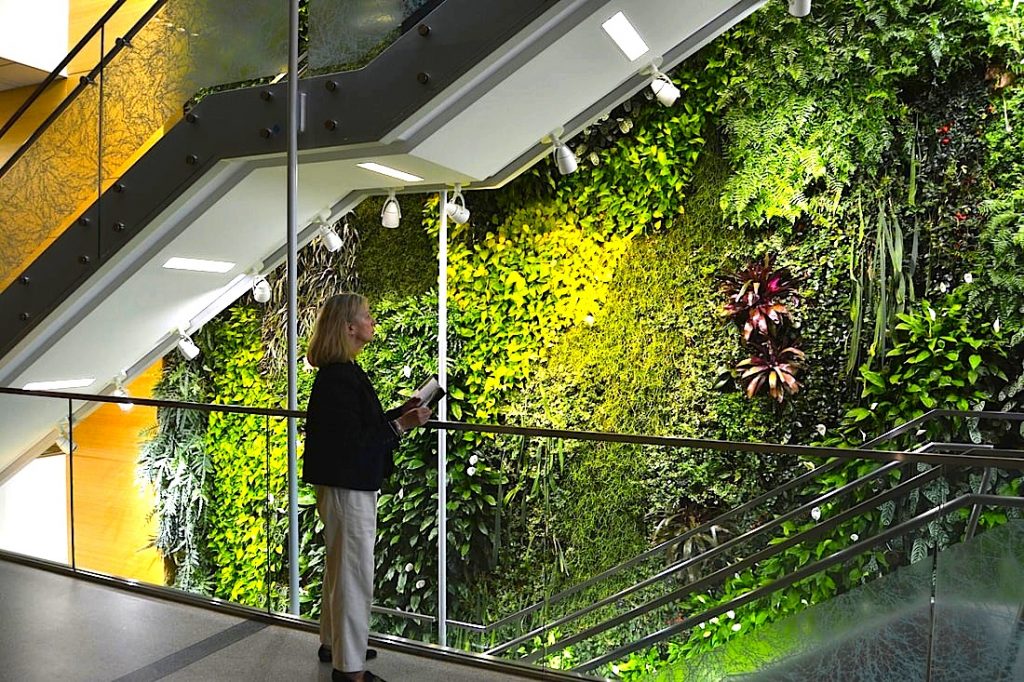
Photo: Stock Rocket
Spring is the perfect time to embrace science by investing in plants that benefit your workforce and business, and perhaps most significantly of all—that benefit your bottom line.
Over the past five decades, a substantial body of research has emerged supporting the wide range of benefits that plants bring to workers and the organizations that employ them. Humans have an innate desire to connect with nature—a phenomenon scientists call “biophilia”. Unfortunately, the spaces where we tend to spend most of our days—workplaces—tend to be largely devoid of any connection to the natural environment. Numerous scientific studies prove the positives of making plants an integral part of your workspace. Weʼve capsulized the Top Ten Findings of this research—highlighting the extraordinary benefits of plants in the workplace.
1. Attention Restoration Theory (ART) (1970s – ʻ80s) – Professors Stephen and Rachel Kaplanʼs landmark research finds that looking at nature—even just images of nature—can shift the brain into a different processing mode, making employees feel more relaxed and better able to concentrate. Their work contributed to, and yet inspires, research substantiating the benefits of plants in the workplace.
2. Plants help clean the air. (1980s) – Scientists at NASA discover that plants are very effective at removing chemicals such as benzene, trichloroethylene, and formaldehyde from the air, making it cleaner for humans.
3. Plants help reduce symptoms of ill health by 25%. (1990s) – A study by the Agricultural University of Norway finds that the introduction of plants to office environments is linked to a 25% decrease in symptoms of ill health including fatigue, poor concentration, dry skin, and irritation of the nose and eyes.
4. Plants help reduce noise levels. (1995) – By absorbing sound, plants help reduce the distracting effects of background office chatter and noise levels—according to a paper by researchers at London South Bank University.
5. Plants help reduce stress. (2010) – A study by the University of Technology (UTS), Sydney, Australia finds significant reductions in stress among workers when plants are introduced to their workspace. Results include a 37% fall in tension and anxiety, a 58% drop in depression or dejection, a 44% decrease in anger and hostility. and a 38% reduction in fatigue.
6. Plants improve employee well being. (2011) – Dr. Tøve Fjeld, a Professor at The Agricultural University of Norway notes that, “The presence of plants can probably result in a positive change in the psychosocial working environment… evidenced by the fact that the occurrence of symptoms (of poor health) linked to the indoor atmosphere was reduced.”

Photo: Milan Markovic
7. Plants help increase productivity. (2014) – Employee productivity jumps 15% when previously ‘lean’ work environments are populated with “just a handful of houseplants”, according to researchers at the University of Exeter (UK). “If you are working in an environment where there’s something to get you psychologically engaged you are happier and you work better.”
8. Plants help reduce sickness and absenteeism. (2015) – The 2015 Human Spaces Report studies 7,600 office workers in 16 countries including the U.S., Canada, Australia, Brazil, France, Germany, India, Denmark, China and Spain. Findings include that adding plants to workspaces helps reduce the risk of sick building syndrome. Notably, Workers whose environments incorporate “natural elements”, i.e. plants report a 15% higher well being score and a 6% higher productivity score than employees whose offices don’t include plants.
9. Plants help boost creativity. (2015) –The 2015 Human Spaces Report also finds that employees whose offices include plants score 15% higher for creativity than those whose offices don’t include plants.
10. Plants help reduce carbon dioxide. (2018-19) – Building on the work of NASA, recent researchled by Google Scholar, Dr. Fraser Torpy, director of the UTS Plants and Indoor Environmental Quality Research Group, Sydney, Australia finds that indoor plants help reduce carbon dioxide levels by about 10% in air-conditioned offices, and by about 25% in buildings without air conditioning. “We found palms beat everything else for reducing carbon dioxide,” says Dr. Torpy.
Which plants thrive best in offices and other workplace environments?

Green Wall Photo: Avant Garden
Not all plants love living in workplaces—you’ll need to consider such conditions as the availability of daylight, how often plants should be watered, etc. Some of the plants that do well in workplaces are Dracaenas, Pothos and Ficus varieties. Additionally, splashes of color added by seasonal Orchids, Kalanchoes and Bromeliad are sure to bring smiles to your workers and clients, alike.
In addition to this body of research, aesthetics are yet another great reason for plants in the workplace— the writing as they say, is “on the wall”.
Avant Garden works closely with you and your team—creating interior plantscapes that are at once aesthetically pleasing, while benefitting your workers and your bottom line.
Using our Senior Management & Professionals Portal is as easy as itʼs convenient—simply visit our Home Page, register and login at: https://avantgardenct.com/registration-info/.
In addition to a wealth of useful, informative resources, our Senior Management & Professionals Portal features our extensive line of plant containers—login and start exploring NOW.

Need something that you’re not seeing in our Portal? Need consulting on a subject that you can’t find there? Just contact us through our website, or call us directly at: 203.746.7577
Enjoy your Avant Garden Senior Management & Professionals Portal experience—and start making your client presentations more effective and compelling than ever before.
The preceding chronology of Top Ten Research Findings was condensed for this blog post. For a complete copy of the unabridged Five Decades of Research—The Strong Case for Plants in the Workplace (pdf), please contact us.
Acknowledgements – Our sincere thanks to the following organizations and individuals: Stephen and Rachel Kaplan, Professors of Psychology at the University of Michigan; NASA; Agricultural University of Norway; Dr. Tøve Fjeld; London South Bank University; University of Technology (UTS), Sydney, Australia; Google Scholar, Dr. Fraser Torpy, director of the UTS Plants and Indoor Environmental Quality Research Group; University of Exeter (UK); Dr. Chris Knight; The 2015 Human Spaces Report; Bill Browning, Founding Partner, Terrapin Bright Green (NYC) and Sir Cary Cooper, CBE, Professor of Organizational Psychology and Health, Lancaster University (UK) and their esteemed colleagues; ciphr.com and Barry Chignell (UK).

